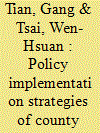| Srl | Item |
| 1 |
ID:
184086


|
|
|
|
|
| Summary/Abstract |
Using the concept of ‘hedging’, we explore how local cadres in China deviate from central policies in order to serve local interests and, while doing so, avoid being called to account by their superiors. Political signals enable cadres to decide when to invest more resources into the implementation of certain policies. In this way, they optimize their performance and avoid the political risks involved in failing to carry out their designated tasks. This article uses county Y as an example in a discussion of county-level implementation of policies related to economic growth and air pollution control. We find that local cadres weaken the functions of the superior ‘special inspection team’ (专项督察组, hereafter inspection team), treating them as political instruments used by the central and local authorities to ensure a greater level of responsiveness at the grass roots. Information concerning the imminent arrival of an inspection team in their locality acts as a signal for cadres to allocate more resources to the enforcement of air pollution control measures, thus maximizing their performance in this area. Through this research, we have endeavoured to provide a deeper understanding of the operating logic of Chinese local governments and the behaviour of county cadres.
|
|
|
|
|
|
|
|
|
|
|
|
|
|
|
|
| 2 |
ID:
111499


|
|
|
|
|
| Publication |
2012.
|
| Summary/Abstract |
The preceding article by Best, Budge and McDonald acknowledges much of the substance of the alternative 'bilateralist' interpretation of democratic governance I advocated and attempts to re-focus the median mandate approach towards a longer-term, and potentially more productive, understanding of the opinion-policy relationship. Both are welcome developments. Despite taking these steps, however, the authors choose to allow the fate of the median mandate thesis to rest ultimately on an attempt to re-establish the short-term one-to-one relationship that I challenged. In this brief note, I argue that this not only undercuts the more positive initiatives noted above, but also is based on a flawed understanding of how the short-term relationship should be operationalised and tested.
|
|
|
|
|
|
|
|
|
|
|
|
|
|
|
|